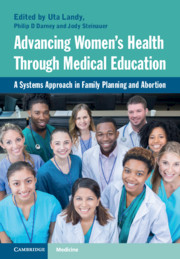 Advancing Women's Health Through Medical Education
Advancing Women's Health Through Medical Education from Section III - Family Planning Curricular Design & Implementation
Published online by Cambridge University Press: 30 July 2021
Abortion training is a required component of US ob-gyn graduate medical education training and recommended in family medicine training. While individual residents may choose to opt out of training in certain conditions – namely personal or religious conflicts- this chapter describes the importance of facilitating participation of residents up to their comfort level in order to learn the essential and transferable skills in the provision of women’s health care. This chapter describes the history of partial participation and provides evidence from multiple studies which have found that learners who object to abortion but partially participate in training in family planning and abortion gain important clinical and professional skills and appreciate the training. It describes various protocols and guidance for teaching leadership to support partial participation, specifics on setting clear expectations, and suggestions for when to facilitate discussions for residents who aren’t certain about the participation level, or plan to opt out.
To save this book to your Kindle, first ensure [email protected] is added to your Approved Personal Document E-mail List under your Personal Document Settings on the Manage Your Content and Devices page of your Amazon account. Then enter the ‘name’ part of your Kindle email address below. Find out more about saving to your Kindle.
Note you can select to save to either the @free.kindle.com or @kindle.com variations. ‘@free.kindle.com’ emails are free but can only be saved to your device when it is connected to wi-fi. ‘@kindle.com’ emails can be delivered even when you are not connected to wi-fi, but note that service fees apply.
Find out more about the Kindle Personal Document Service.
To save content items to your account, please confirm that you agree to abide by our usage policies. If this is the first time you use this feature, you will be asked to authorise Cambridge Core to connect with your account. Find out more about saving content to Dropbox.
To save content items to your account, please confirm that you agree to abide by our usage policies. If this is the first time you use this feature, you will be asked to authorise Cambridge Core to connect with your account. Find out more about saving content to Google Drive.